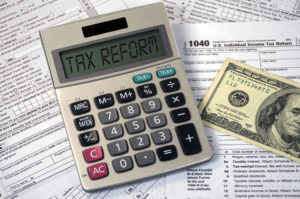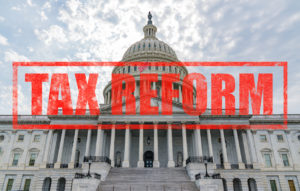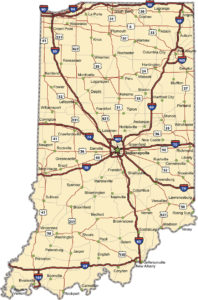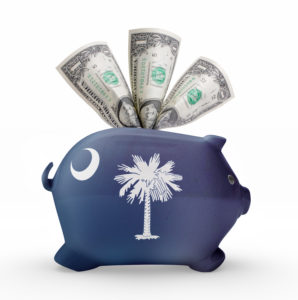The Good & Bad of the New Tax Reform: How California's Affected

The beginning of the year marks the start of many new things: a new year, new business goals and new federal tax reform. What do the changes in tax law mean for California companies – especially in Silicon Valley?
In The Daily Journal, Carl Guardino (CEO of the Silicon Valley Leadership Group) likened the latest tax reform to the 1960s western, "The Good, the Bad and the Ugly" - and for good reason. While there are some changes that will benefit corporations, others will likely make it difficult for businesses in the area.
Are these changes considered ‘good, bad and ugly’ throughout the entire state, all the way down to Southern California? Keep reading to find out how this year’s federal tax reform will affect corporations in Silicon Valley as well as Southern California.
‘The Good’ of Federal Tax Reform
One big change to the latest tax reform is corporations seeing tax rates slashed; instead of paying 35 percent, they'll only need to pay 21 percent. Also, companies making profits overseas will only be subject to taxes based on where the sales are made, eliminating an additional tax they've been paying in years prior. As you can imagine, these changes will make a big difference for many companies in the area. It also makes U.S. businesses more competitive with the global innovation economy, an important field for many Silicon Valley enterprises.Read more
State Tax Deduction Limit? California Fights Back.

By now many of us in California have contemplated our fate regarding how the tax reform act passed by Congress last month will likely hurt Californians as a result of the federal limit on the state and local tax deduction for individual taxpayers.
In an effort to mitigate the limit of this deduction for Californians, state lawmakers have quickly looked to alternatives.
New Tax Plan – limited deduction
For residents of California and other high tax states, a major item of concern in the tax act is the cutback of deductions for state and local taxes (SALT). Taxpayers will now be able to deduct only up to $10,000 in SALT, including property taxes. According to this recent LA Times article, limiting the SALT deduction could affect as many as 6 million Californians. California taxpayers accounts for almost 20% of all SALT deductions, which is the highest state in the nation. Other states with large amounts of SALT deductions include New York, New Jersey and Connecticut, perhaps not coincidentally - all “blue” states.
How to mitigate the problem?
One option proposed last week by Senate President pro Tempore Kevin de Leon (D – Los Angeles), would be to recast state and local taxes as charitable contributions, which remain fully deductible under the GOP tax act. SB227 (known as the “Protect California Taxpayers Act”) would allow California taxpayers to make a charitable donation to a government entity, the California Excellence Fund, in the amount of their state taxes. They would then receive a dollar for dollar tax credit on their CA tax return in the amount of the donation. (For example, a taxpayer owing $15,000 in property taxes, might pay this amount to the Excellence Fund. The taxpayer then gets a tax credit for the entire $15,000 on their CA return. On the federal tax return, the taxpayer correctly classifies this amount as a charitable contribution, which is not limited to the $10,000 SALT rule. So, by essentially reclassifying the property tax as a contribution, the taxpayer still gets the full deduction for the entire $15,000, rather than just $10,000 on their federal return.)
Playing Devil’s Advocate?
So, that all sounds good. But will the IRS allow it? Will Congress?
What constitutes a charity? The Internal Revenue Service (IRS) and federal courts have ruled that government entities can qualify as charities for the purpose of the charitable deduction, even when the donor receives a full state or local tax credit in return. California and other states already have similar programs in place. For example, CA has a College Access Fund, which grants a 50% tax credit for contributions to the Cal Grants Program, which aids low-income college students. 17 additional states use a similar model to fund private education.
While the proposal is certainly creative, and has some defendable history behind it, we recommend to be cautiously optimistic about its ultimate passage in the state and then whether Congress will find a way to shut it down by passing further clarifying legislation.
For more information regarding this act published by the San Joe Mercury News, click here.
Stay tuned for further updates!
If you have any questions, please don’t hesitate to contact us at info@milesconsultinggroup.com. We are happy to help with all of your tax needs.
Happy New Year! An Online Sales Tax Preview for 2018

Happy New Year from everyone at Miles Consulting Group! We hope you had a wonderful holiday season and are looking forward to 2018. We certainly are!
What’s on the horizon for the coming year? We’re looking forward to seeing how the following state tax news unfolds during this year:
- States’ conformity to the new federal tax act just passed. Many states may de-couple from some of the changes in the federal law. Planning for this could prove challenging!
- Supreme Court cases: It will be interesting to see if some of the state legislation we’re watching makes it to the U.S. Supreme Court, such as South Dakota's Senate Bill 106, Ohio's "cookie directive" or Indiana’s economic nexus. Could this finally be the year that the Supreme Court (or Congress) weighs in on the online sales tax debate?
- Increased compliance for those that decide not to collect sales taxes (because they don’t have nexus in a state), but require sharing customer data in states such as Washington and Colorado. We expect more states to jump on this bandwagon in 2018.
Thank you for an Awesome 2017

In our last blog post of 2017, I’d like to stop and reflect for a moment with you, my readers.
As we quickly approach 2018, we know that the multi-state tax landscape will continue to be interesting. We’ll have plenty of opportunities in the upcoming months to discuss the state tax impact of the recently passed tax act, potential Supreme Court cases, sales tax on online taxes, and myriad other “developments” in many states.
But today, I’d like to simply say thank you! Thank you to clients who continue to engage with us for your multistate tax needs – from special projects, to nexus and taxability studies, to controversy work and much more! Thank you to colleagues, CPAs, attorneys, temporary/fractional CFOs and compliance firms with whom we partner to deliver amazing service to our clients. Thank you to trusted advisors and colleagues in my many networking groups (ProVisors, AFWA, NAWBO and WITNG, among others). Thank you to my business coach of many years, Barbara, who helps to keeps me accountable and on track – both with the state tax consulting and my Jumpstart Your Rainmaking program. And of course to my family – who continue to support me in these endeavors and frequently stop me and ask “How are you really doing?!” or “How can I help?” And thank you also to the team behind Miles Consulting Group who help with IT, marketing, administration, and so many other things that continue to keep us humming! Thank you Jeff for all that you do!
We are excited about a prosperous 2018. We look forward to continuing to work with our current clients and meeting and working with new ones. We’re already looking at some travel to conferences in the new year (both to take in some new information AND to be on the teaching side to share information with others), and continuing our on-line education via webinars (both on the tax technical and Rainmaking sides of the house.
So, join us in turning that calendar page to January 2018 in just a few days. We are excited about working with all of you and seeing what that year will bring.
Happy holidays and Happy New Year to you and yours!!
Fondly,
Monika & The Miles Consulting Team
The Top 8 Significant Sales Tax Issues of 2017
As 2017 comes to a close, we thought this would be a good time to reflect on the past year. There have been quite a few notable developments in the online sales tax realm and in multistate issues in general over the last 12 months. Here are 8 developments that we thought were of particular significance, which we’ve discussed on our blog in the past year.
1. Fascinating Ramifications of Colorado's New Online Sales Tax

Colorado has been at the forefront of the internet sales tax debate since 2010, when it passed a law that required companies with more than $100,000 in sales that did not have nexus in the state to 1) alert Colorado customers that state sales or use tax is due and 2) file annual reports to the state, listing all the names, purchases and shipping addresses of Colorado customers.
After making its way to the courts and several rounds of negotiations between the state and taxpayers, the law went into effect on July 1, 2017. Find out why the U.S. Supreme Court chose not to hear the case and more in the full blog post.
2. Another Move Toward Economic Nexus

When businesses sell their products across state lines, they need to think about whether they have taxable presence, or nexus, in the state and if their products are taxable. In 2017, several states began pushing the boundaries of defining the physical presence in order to generate more revenue. Welcome to the concept of "economic nexus."
Read more about this concept and how states such as Indiana are pushing limits through economic nexus in this blog post.Read more
FOCUS ON NEBRASKA

This month, we take a journey out west to Nebraska, where early settlers roamed the state. It used to be nicknamed the “Tree Planter’s State,” but was changed in 1945 to the “Cornhusker State.” Husking corn was done by hand by early settlers of course (before the invention of husking machinery). The University of Nebraska athletic team is called the Cornhuskers.
Nebraska is a Midwestern U.S. State encompassing the prairies of the Great Plains, the towering dunes of the Sandhills and the panhandle’s dramatic rock formations. Lincoln, the capital and a vibrant university town, is distinguished by its soaring state capitol. The city of Omaha is home to the Durham Museum, which honors the state’s pioneering past in a converted railroad depot.
South Carolina to Amazon: Collect Sales Tax Now

States are continuing to come up with ways to collect sales tax from online sellers (specifically Amazon's third-party sellers). South Carolina recently filed a motion in court to force Amazon to collect these taxes and fees on behalf of its third-party sellers.
As it is now, Amazon collects sales tax on items purchased directly from them, but the retail giant does not collect it on sales made on the site by a third party. South Carolina is claiming it could lose more than $500 million in sales tax if Amazon doesn't begin collecting them now, and is asking the court to require the retailer to charge sales tax and put it into a trust or escrow-type account until the case is settled.
South Carolina’s Argument for Amazon Collecting Sales Tax
The state is most concerned with receiving the sales tax they’re owed. Someone owes it to them, and they’ve chosen to pursue Amazon for it (rather than numerous third-party sellers or the ultimate consumers).Read more
More Amnesty on the Way!

Across the U.S., amnesty seems to be a popular topic these days. The Multistate Tax Commission’s (MTC) special amnesty program for marketplace retailers recently ended. And a few other states have recently announced their own amnesty programs so that they can benefit from potential increased compliance as well. Connecticut (CT), Ohio (OH) and Rhode Island (RI) are the latest states to roll out amnesty programs of their own. And we expect others to follow. The states administer amnesty programs because they want to induce companies to become compliant by waiving, or limiting penalties and interest for prior unpaid taxes.
Recent MTC amnesty program
Many states just took part in a special amnesty program. The MTC had negotiated this special program for online sellers using marketplace fulfillment services (such as Fulfillment by Amazon) that created nexus and thereby had sales tax and income tax obligations. Twenty five states participated, including CT and RI. To find out more about this amnesty program, click here.
This special amnesty program waived taxes in addition to interest and penalties. We’ve cautioned our clients not to expect amnesties to be that generous in the future. Most state amnesties allow taxpayers to waive penalties and some interest, but rarely the tax itself.
FOCUS ON MICHIGAN

This month takes us to the Wolverine State of Michigan. The origins of this name are obscure, but may be derived from a busy trade in Wolverine furs during the 18th Century.
Its largest city, Detroit, is famed as the seat of the U.S. auto industry, which inspired Diego Riviera’s murals at the Detroit institute of Arts. Also in Detroit is Hitsville U.S.A., the original headquarters of the Motown Record Company. Michigan is home to many great musicians including The Supremes, The Temptations, Stevie Wonder, Smokey Robinson, Bob Seger, Kid Rock and Alice Cooper.
12 Important Details: Sales Tax & WA's New Marketplace Facilitators

We recently shared an overview of Washington’s New Marketplace Fairness solution. While we’re skeptical it will help rather than hinder, it’s important you know additional details about marketplace facilitators and sellers.
Marketplace Facilitator Overview
- Starting in January 2018, marketplace facilitators will need to collect sales tax on behalf of marketplace sellers that have not established a physical presence, or nexus, within the state.
- Facilitators are responsible for collection of sales tax if they themselves have nexus in Washington State or $10,000 or more in retail sales within the state. This can include their own products as well as sales they make on behalf of a remote seller.
- What exactly do these facilitators need to do? As the Department of Revenue explains:
- Collect and pay sales tax on sales to Washington consumers
- Follow the use tax notice and reporting requirements [as explained].


















